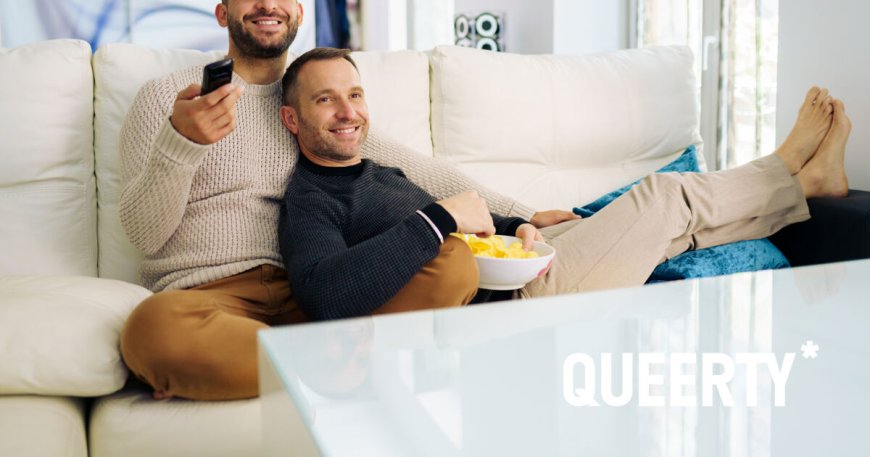Gay guys reveal why being in a “queerplatonic” relationship is better than a romantic one
What if you could have the perks of a romantic relationship, but without all the things that make them complicated?


Let’s face it, romantic relationships in the queer community take work.
It takes constant effort and ongoing communication to continuously meet your partner’s emotional and physical needs, re-negotiate things like monogamy, and figure out when and how often you’ll have sex. In addition, romantic dynamics can also create resentments, jealousies, and trigger insecurities in one another that have to be worked through.
On top of that, the intoxicating feelings you may have felt in the beginning phases of your courtship usually start to wane over time, and sexual compatibility can change. It can sometimes seem harrowing to think about how to keep the spark alive amidst the relentless barrage of bills, family drama, work, and existential dread we regularly contend with in our day-to-day lives.
Yet, even with the annoying things that come along with these types of partnerships, there’s a reason so many of us still seek them. If you’ve got that special someone, you’ll always have that “plus 1” for your friend’s housewarming party, someone to vent to when your boss drives you crazy at work, and a cuddle-buddy for the endless feed of Drag Race episodes on Friday nights.
So, what if you could have the perks of a romantic relationship, but without all the things that make them complicated?
More and more queer people are saying you can, with what they are calling a queerplatonic relationship, or “QPR” for short. In a QPR, you can take sexual or romantic intimacy off the table, while still partaking of anything or everything that a close relationship has to offer.
For example, if you enjoy living with someone, sharing intimate details of your life with a trusted source, traveling with the ideal companion, or even starting a family, you may be able to do so in a relationship that removes the pressures of what society says a healthy partnership is supposed to look like.
In 2010, an online thread called Kaz’s Scribblings introduced the idea of queerplatonic partnerships. The description spoke to those who wanted an aromantic relationship that doesn’t conform to the binary separation between romance and close companionship.
Sure, straight people could create this kind of non-sexual or non-romantic intimacy too, but as queer people, we’ve always bucked social norms, especially those rooted in heteronormativity, and resisted the pressures of falling into expected roles. Therefore, we are much more willing and able to adopt this kind of non-traditional dynamic, which is why QPR’s are much more common in our community.
To peak our curiosity, we asked some men in queerplatonic relationships to tell us what the dynamic is like for them. To our surprise, we learned QPR’s felt more fulfilling than any other romantic relationships experienced in the past.
Brian, a 32-year old man living in Los Angeles, tells us that he’s been in a QPR for about a year.
“I had a bunch of different boyfriends, and it usually got annoying and complicated,” he says. “They would always be jealous when I was talking to another guy or attracted to them, and it would trigger all these insecurities.”
“Eventually, my best friend and I, who is also gay, decided to move in together, and slowly we realized we were acting just like boyfriends, except we weren’t having sex…and we were both fine with that.”
When asked if he feels like this was “settling” in some way, Brian says it’s quite the opposite.
“There’s a certain feeling of stability and support that comes from our partnership. We enjoy sharing the financial responsibilities, feeling emotionally supported, and can share our hopes and dreams with one another. We love and respect each other, only it comes without the pressures of having to maintain a consistent sexual relationship. We even sleep in separate beds, which I LOVE.”
Another gay man, Stephen, 48, says his queerplatonic relationship started out romantically, but eventually it felt like there was pressure to kiss when they got home, or put sex on the calendar, even when they both weren’t feeling it. After a few months, they sat down to have “the talk” about whether or not they should break up, and both he and his partner decided they didn’t want to give up the emotional intimacy they had.
Stephen joked, “I’m not about to give up my back rubs when I get home after a stressful day! And Chris said he wasn’t going to learn how to cook at this point in his life. So why not just stay together?”
They mutually decided that everything in their relationship was working, and they didn’t need to throw it all away just because they were more platonic than romantic or sexual partners.
Stephen said that one of the best things about being in a queerplatonic relationship is that they get to make up their own rules, because there’s no outside influence or expectation deciding those for them. For example, we asked if you are allowed to kiss in a QPR relationship.
Stephen responded, “Yes, if that’s what you both want. But if you don’t want to, that’s fine too. The same goes for things like sleeping in the same bed, cuddling, and holding hands in public.”
John, a 33-year old who self-identifies as being in a QPR, says he’s always excited to see his partner, because there’s no pressure involved. “I feel like I’ve known my man forever, and can’t imagine living without him”, he says.
One surprising finding was that being in a QPR doesn’t necessarily mean there won’t ever be any sex or romance. Partners can have some of both, if they choose, because they make up all of the rules.
So, while platonic love has always been associated with a lack of sex or romance, the queerplatonic relationship contains a spectrum of physical affection, ultimately prioritizing the needs of the people involved.
Sounds…kind of great?
John also says everyone assumes he and his partner are a regular couple, and even assume they must have an open relationship, but he doesn’t feel the need to explain anything to them
“I feel most at home around Peter, and that’s all I care about. What other people think doesn’t matter,” he says.
As queer people, we’ve always been ahead of the curve in defining what works for us, and not taking on societal expectations. The queerplatonic relationship is no exception, as the main tenant seems to be doing what feels right for both parties involved.
Although it may not be for everyone, perhaps it’s comforting to know that some queer people out there may be spared from the age-old, “I have a headache” excuse, when their partner isn’t in the mood. Plus, isn’t a head massage sometimes just as fulfilling?
Related:
Is it a good idea to wait for someone who says they’re not ready for a relationship?
Was there a man you once waited for, and what happened?

 Mark
Mark 






